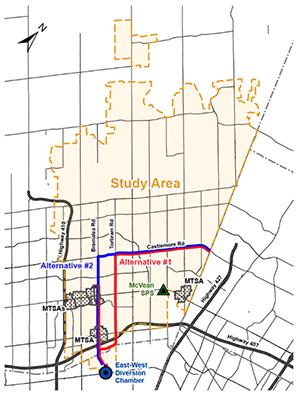East Brampton wastewater capacity improvements
Project overview
The Region of Peel is planning important upgrades to the wastewater system in East Brampton to support expected population growth and meet Ontario’s housing goals. As part of this effort, we’re conducting a Schedule B Municipal Class Environmental Assessment (Class EA) to explore options for building new large sewer pipes (called “sanitary trunk sewers”) in the area. These upgrades will ensure reliable service, support sustainable development, and align with regional planning objectives.
Project background

The population of Brampton and parts of Caledon are expected to grow significantly by 2051, especially around major transit stations (MTSAs). To support this anticipated growth and protect the environment, the Region recently completed a feasibility study to look at building new sanitary trunk sewers in East Brampton. This would increase sewer capacity without relying on the McVean Sewage Pumping Station (McVean SPS).
The feasibility study identified two alternative routes for the new trunk sewers:
- Alternative #1: Castlemore Road from Highway 50 to Bramalea Road, and Bramalea Road to Derry Road
- Alternative #2: Castlemore Road from Highway 50 to Torbram Road, Torbram Road to Derry Road, and Bramalea Road from Central Park Drive to Derry Road
The study area and alternative trunk sewer routes are shown in the adjacent figure.
As a next step, the Region has initiated a Schedule B Municipal Class EA. The alternative sewer routes already identified will be looked at more closely to determine which one works best to meet the needs of the community and the environment.
Municipal Class EA process
This project follows the multi-step Schedule B Class EA process which is used across Ontario to ensure major infrastructure projects are carefully studied before construction. The process involves assessing different options, identifying possible effects on the community and environment, and determining how to reduce negative impacts.
The Schedule B Study will include the following phases:
- Phase 1: Identify the study problem/opportunity
- Phase 2: Identify and evaluate alternative solutions
The outcome of the evaluation exercise, supporting studies, the decision-making process and public feedback will be documented in a Project File Report.
Your input is important
Public consultation is an important part of the Municipal Class EA process. We will be holding two in-person public meetings, called Public Information Centres (PICs), where residents and interested groups can learn about the project and share feedback. Public engagement throughout the project is key to ensure that decisions made reflect and support the community needs.
Public Information Centre (PIC) No. 1
PIC No. 1 was held on June 18, 2025 at the Greenbriar Recreation Centre in Brampton.
PIC 1 documents
Project timeline
The following are key dates for the study:
- May 2025: Project initiated and public notices distributed
- June 18, 2025: PIC No. 1 was held
- Winter 2025/2026: PIC No. 2 will be held to present details of the alternative solutions, evaluation process and the preferred solution. This will allow for feedback on the evaluation process and include further details on the selected trunk sewer route.
- Spring 2026: Finalize Project File Report.
Contact us
If you have questions about the project or would like to be added to the contact list to receive updates, please get in touch with a member of the project team:
Gareth Clemens
Project Manager, Region of Peel
437-788-6195
gareth.clemens@peelregion.ca
Bram Bontje, P.Eng
Senior Project Manager, CIMA+
bram.bontje@cima.ca
Peel Region is committed to ensuring that all services, programs, and facilities are inclusive and accessible. If you need any accommodations to share your comments or feedback on this study, please contact the Project Manager.